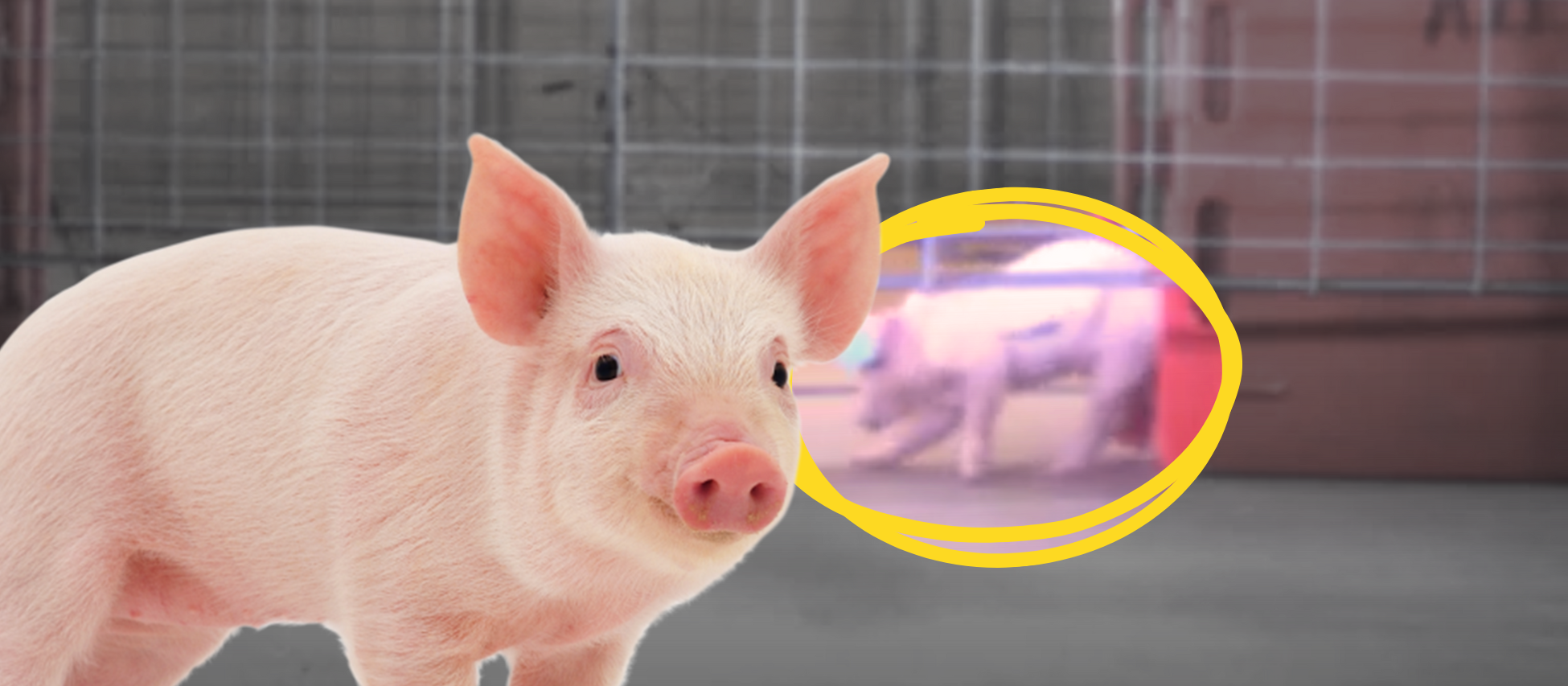
The Harder You Hit a Baby Pig, the More You Hurt Them
Support the FDA Modernization Act 3.0: This new federal bill aims to amend and strengthen the Food and Drug Administration’s existing federal regulations that allow the utilization of modern, human-relevant, non-animal research methods.
The harder you hit a baby pig, the more you hurt them.
This, Animal Partisan and Rise for Animals have confirmed, is the takeaway from modern day animal research that uses blunt force trauma to damage the brains of four-week-old piglets.
That’s right – newly-obtained public records show that researchers make money brutalizing baby pigs to (re)confirm something that every single one of us already knows; and that, adding insult to injury, they are paid to do this under the guise of working to save and improve human lives.
Yet, over 100 years’ of unethical traumatic brain injury (TBI) studies have failed to improve the wellbeing of human-TBI-sufferers.
The translation rate of findings from TBI animal research to human medicine has been almost, if not, nil, and researchers themselves have explained why:
One: “notable differences” between the brains of different mammalian species result in “substantially different responses to trauma of comparable severity or type from species to species”, such that one species of animal cannot serve as a TBI “model” for another species of animal (humans included).
Two: “each patient has an individual form of TBI”, which acts as “a complex disease process” unique to that patient. In other words, the “heterogeneity observed in patients with TBI” (which is affected by not only the physical injury itself but also the patient’s age, health, sex, and genetics) cannot be recreated by inflicting “a relatively homogenous type of injury” upon animals (whose age, health, sex, and genetics are “controlled”); and, it follows that not even human TBI patients can serve as “models” for one another (much less that other-than-human animals can serve as “models” for humans).
These types of scientific conclusions have never stopped animal researchers, however, as they just keep chasing dollar signs while shouting grossly disingenuous and scientifically unmoored generalisms about helping humans.
Case in point: after decades of failed and barbaric experiments on rodents, ferrets, dogs, monkeys, and adult pigs, researchers continue to ignore both the unethical nature and the scientifically-established limitations of animal research – instead, fixating on a different experimental victim: baby pigs.
Take, for example, University of Georgia researchers, who recently inflicted “[c]oncussive” traumatic brain injuries upon four-week-old, “‘toddler-aged’ Landrace piglets”.
To inflict these injuries, the researchers used “controlled cortical impact (CCI)”, meaning that these babies were secured to a metal device “using ear bars and straps”; had the “soft tissues” “over the top[s] of their cranium[s]” cut away “to expose their skull[s]”; underwent craniectomies (i.e., skull bone removals) using an air drill; and, then, had their brains bashed with an “impactor device”.

Next, researchers analyzed the piglets’ “gait” – forcing them to try and ambulate away from aversive stimuli despite their impaired motor functions – before killing them.
Researchers learned nothing human-relevant from the torture and killing of these 16 piglets, but that was never the goal anyway.
The researchers themselves acknowledged that, prior to this research, it had already been established in humans that injury severity “directly correlates with long-term functional outcomes” – that a “clear correlation” exists between brain injury size and long-term consequences (like motor deficits) – that the harder someone gets hit in the head, the more harm it causes them. And, by their own acknowledgement, this study did nothing but demonstrate this same principle in baby pigs.
But, this did not stop the researchers from touting this experiment as a success and calling for “[a]dditional studies”, while at the very same time conceding that this research contributed nothing to the fundamental, still-open question of how these types of brain injuries result in motor impairments – the very question that needs answering if human victims of TBI are to be helped.
Moreover, rather than motivating a change in the research itself, this failing – in a perverse yet poignant example of the animal research industry’s self-perpetuating nature – actually benefited the researchers, who were able to secure more (and more) funding for the very same type of unethical and unsuccessful research.
(Indeed, since this study, the National Institutes of Health (NIH) has bankrolled approximately $1.3 million dollars’ worth of TBI studies utilizing baby pigs at the University of Georgia alone.)
In this way, the animal research industry will continue traumatizing piglets and other nonhuman animals in TBI experiments – and denying humans new therapies – for another 100 years . . . unless we act.
We can start right now by supporting a piece of newly-introduced, federal legislation, H.R. 7248: The FDA Modernization Act 3.0, which would require the Food and Drug Administration (“FDA”) to implement the FDA Modernization Act 2.0 by amending its regulations to allow for the use of human-relevant, non-animal research methods.
This bill might not save even most piglets from research laboratories in the near future, but it does have the potential to prop up new dollar signs for animal researchers to chase . . . luring them farther and farther away from babies who belong safe and free with their mamas.
Share this page on Facebook or X (Twitter)